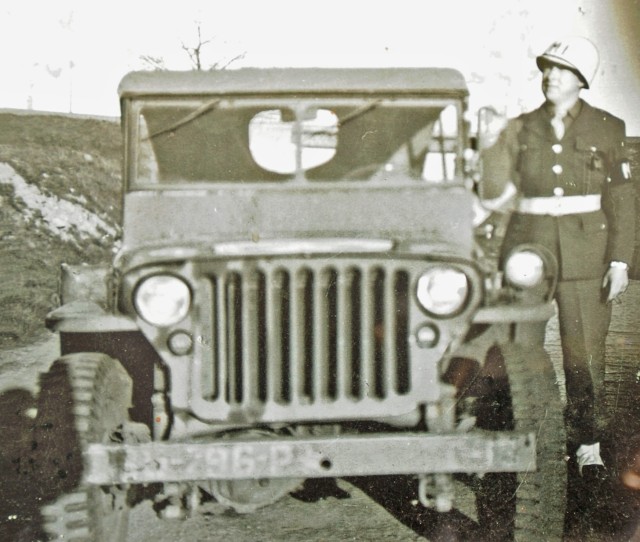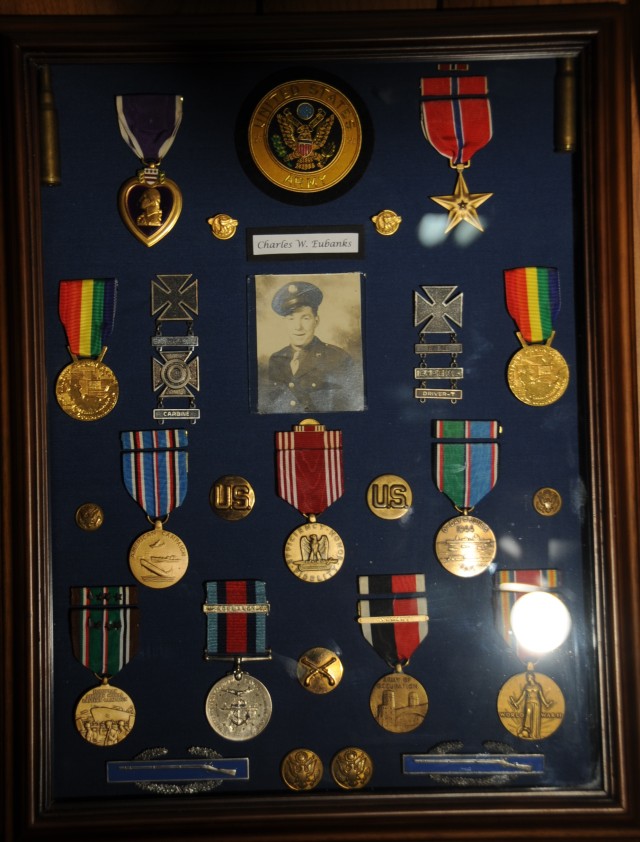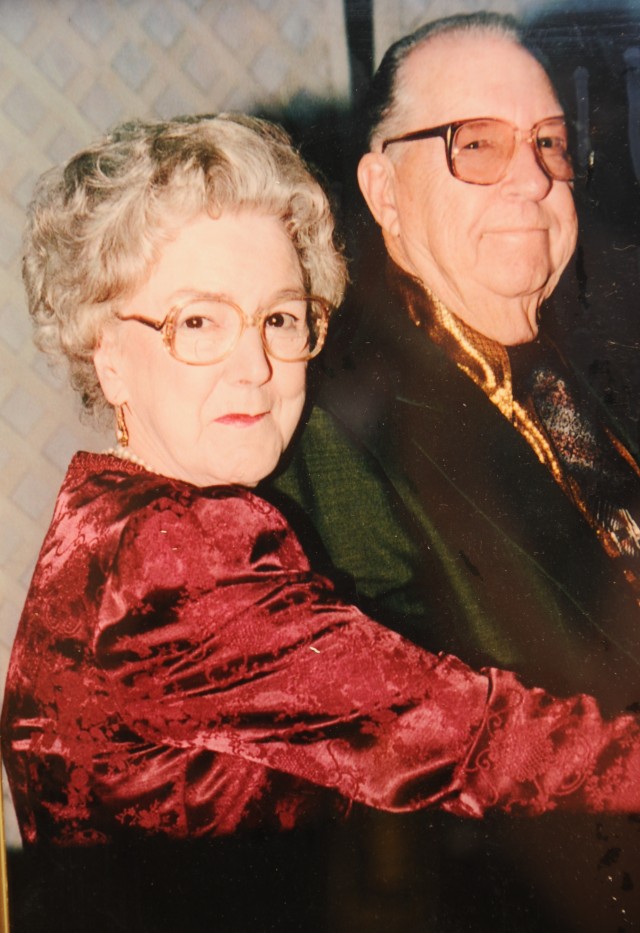WEST POINT, Miss. (Army News Service, May 18, 2009) -- Charles William Eubanks, a resident of West Point, Miss., wants to be remembered - not as a hero, but as a survivor of D-Day.
"Forget about what you saw on Saving Private Ryan; the film footage shown of Omaha Beach was taken from an airplane," said the 86-year-old World War II Army veteran.
"It was much worse from our level -- the Nazis totally had us pinned down in the sand -- all the while, blood, human flesh, body parts, and metal were raining down on our Soldiers lucky enough to be alive," Eubanks said. "We were on our bellies from the time we left the boats until the time we finally took our objective."
Eubanks, a native of Troy, Miss., is a decorated Army veteran who survived both the Normandy invasion and Battle of the Bulge.
"I survived because of two things," he explained, "divine intervention and the training at Camp Van Dorn. That is why I am a survivor of the worst battle that there's ever been. If we hadn't been successful June 6, 1944, Americans would be speaking German right now."
He remembers all too well that others were not so lucky that day 65 years ago.
Joining the War Effort
A junior in high school at Pontotoc when Pearl Harbor was bombed, Eubanks recalled how he and friends talked about the war.
"We boys knew we were going to fight," he said. "But we had discussions among ourselves as to whether we were going to fight for our country, for the politicians, or for the flag. But everybody knew we would fight - the world was in turmoil."
In the fall of 1943, Eubanks said he went to a school in Tupelo. "I then went to Bristol, Connecticut, and worked for $325 a month as a copper plater, more money than a country boy ever had."
By this time, the recruiting offices had closed and everybody, including volunteers, went into the military and naval forces through the draft.
"But I didn't feel right about not going to war; my brother was already serving and most of my friends, too, and I felt it was my time to go, so I volunteered for the draft," Eubanks said, noting that doing so was something his parents wouldn't question.
"I should have listened to my employer," Eubanks joked. "He told me he could defer me three times, and when I got into the thick of that hell on earth, I wished I'd listened to him."
Eubanks remembered boarding a school bus and heading to Camp Shelby, near Hattiesburg, Miss., where he was inducted into the Army.
The veteran remembers one of the draftees at Camp Shelby taunting training officials.
"Jessie Dearing said, 'you don't need to train us: We've been shootin' squirrels since we were six or seven years old. We can shoot those Germans just as good without training,' and he did."
Eubanks left Camp Shelby and headed for boot camp at Camp Van Dorn in South Mississippi, training with the 63rd Infantry Division.
"We were treated like animals during boot camp. For two weeks, we were 'caged' and purposely driven to think nothing of ourselves, and were taught to keep moving forward," said Eubanks pausing, and raising a withered index finger upward. "That's how we were trained."
After basic training, Eubanks shipped out from New Jersey and arrived in Liverpool, England, where the war was already in swing.
"We were all so young," he said. "So many of us were uneducated Southern boys, but we knew enough to know it was going to be bad."
Stateside to Channel side
After arriving in Liverpool, he became part of the 29th Division and assigned as a scout.
On the morning of June 6, 1944, Eubanks was among the 150,000 Soldiers who stormed Normandy's beaches. At three in the morning Eubanks said, "They gave us a back pack and dropped us out. I couldn't swim and I don't know how I made it."
"We were in water over our heads and a lot of the Soldiers drowned before reaching the beach," said Eubanks, adding, "The Germans did not intend for the allies to get to the beach; they had complete control of the area. On the beach, Soldiers found land mines, mortars, small arms fire - the Germans were pretty smart people."
After visiting Normandy years later, Eubanks said of that day, "It was the biggest resistance Germany had. They (Germany) were the most prepared army there was; they had big concrete and steel bunkers, and even today, those same bunkers are as good now as they were in 1944."
He talked a great a deal about the American military leadership of those days - the good and the bad.
Remembering some words Patton shared with the troops, Eubanks heard Patton saying: "You old foot Soldiers is the sorriest you could be unless you win this war." Patton also told troops they were bought and paid for by Uncle Sam. "We feed you, clothe you, and give you guns and you're going to fight!"
He served under Patton for about two weeks before reassignment under the command of Gen. Omar Bradley, who the young private first class described as a Christian man compared to Patton.
"Patton low-graded us to get us to fight. He played on your mind, but it seemed to work because we won the war, but General Bradley was a Soldier's Soldier."
Bradley would later go on to become the U.S. Army chief of staff and a five-star general. Still under Patton's command, Eubanks said that on June 11, five days after the landing, he and other Soldiers dug in at the hedgerows. A German reconnaissance plane flew just above them, the pilot searching for his landing strip under darkness.
"All down the line, we told our boys not to fire on the plane because it was a trap set by the Germans," Eubanks explained. "One foolish Soldier took a potshot at the plane and when the pilot saw the light, he laid a strip of bombs right on top of us."
Eubanks and many other wounded Soldiers were evacuated to a hospital near Coventry, England.
"The Red Cross broke the news to my mother that I was missing in action, and the Army sent her my dog tags, my watch, and a copy of the New Testament that we were given in basic training," Eubanks chuckled. "All the while I was recuperating at the hospital in England."
A letter from the War Department arrived for Mrs. Louise Eubanks July 5, 1944, expressing the Army's sorrow for their recent erroneous telegram. The letter further explained that her son, Private Charles W. Eubanks, was wounded in action on June 11, 1944 in France, and was hospitalized in England. The Army, however, would not give her details about the nature of his wounds.
Shrapnel remained in the wound to his left leg, but he learned to walk again with the help of a young nurse's aid at the hospital, 17-year-old Cynthia James, who lived in nearby Birmingham, England.
"The best thing about the war was meeting my wife -- the moment I met her in the park one day, I knew that I was going to marry her," Eubanks said, with a large smile and twinkle still in his eye after more than 57 years of marriage.
Eubanks believes the attention of the lovely Welsh nurse's aid had just as much to do with his speedy recovery as the treatment received by doctors. With the war still very much in progress, the same war that brought the two together also separated them.
Coming Home as Survivor
Released from the hospital in October 1944, Eubanks was sent back across the channel. The Battle of the Bulge would be Hitler's last great offensive.
"By the time we got to Berlin, the city had been carved into four pieces," Eubanks said.
He spent about three months of occupational duty in Berlin after the Bulge and learned to despise the Russians almost as much as he did Hitler.
"The Russians wanted to destroy Berlin, even though the war was over," recalls Eubanks.
In the spring of '46, Eubanks sailed back to America, spent two weeks mustering out at Camp Shelby, and took the bus north toward home.
He arrived home in Pontotoc unannounced. His mother, who two years earlier thought she had lost him, now had him home for good after two years, nine months and 13 days. She also learned that he had married (March 1946) the young nurse's aid who had helped him recover.
He returned to England to be with her until her country clearances had been approved, and then he returned home to Pontotoc. Traveling from Birmingham, England, to Birmingham, Ala., she arrived in 1947 and he was waiting there for her.
"She was the best thing that came from my service during World War II," said Eubanks, resting peacefully in the kitchen chair at their home in West Point. "Then we added three beautiful children, five grandchildren, and two great-grandchildren. Yes. Life has been very good after all those years of marriage."
Cynthia Eubanks passed away Aug. 5, 2004. Eubanks' daughter, Annie, says he now spends time appreciating the family pictures and military awards and decorations.
"It wasn't until mother passed away that he has really started talking about his military service and World War II experiences," she said with deep admiration in her voice.
"On Memorial Day we have a ceremony here to remember the boys from counties like Pontotoc and small communities in the surrounding area. They were behind a plow one day, hunkered down behind a tank the next," said Eubanks. "Those with whom I fought alongside, few returned home, but I think about them every day. The boys from the 29th hunkered down, running behind tanks across Europe, nearly 20,000 of them getting killed -- teenagers saving the world, aching for their mothers."
His Silver Star, Bronze Star and Purple Heart are part of his museum in his modest West Point home. Still, the first thing Eubanks tells visitors who see the awards is that he is not a hero, but a mere survivor of D-Day, because the real heroes never made it back home.
(Sandy Ates is staff writer with the Mississippi National Guard Public Affairs Office.)






Social Sharing